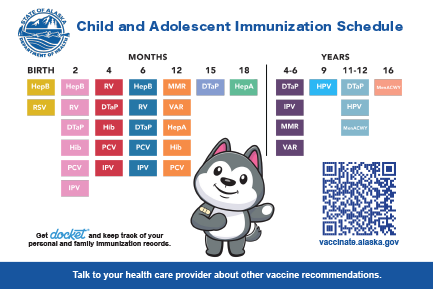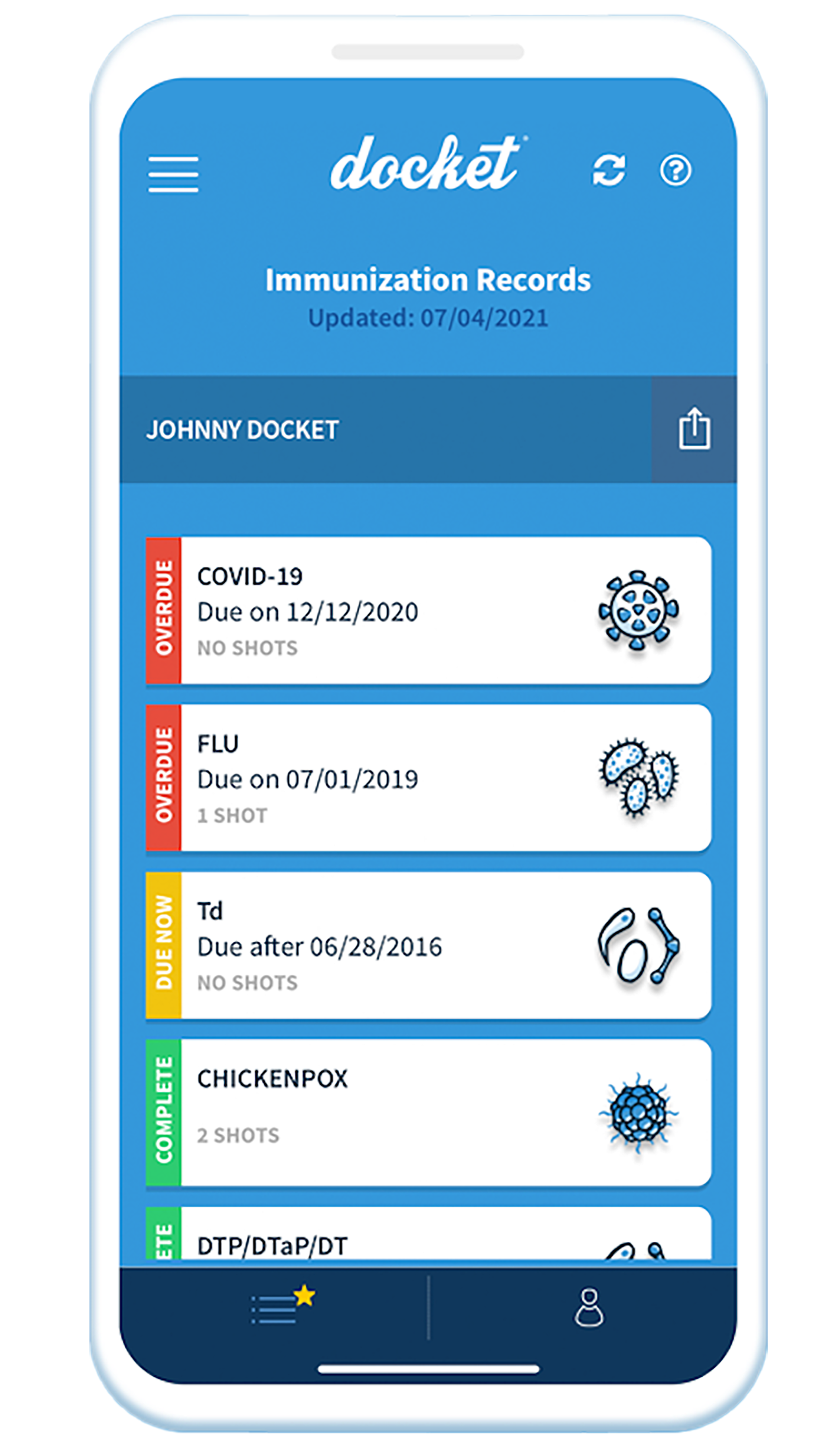Immunization Information
Recommendations for vaccines
Overview
Immunization is one of the best ways to give children a healthy start and help protect their health throughout their lives. Vaccines can protect people of all ages from serious diseases. By getting recommended vaccines, you reduce your risk of getting sick and help protect others around you who are vulnerable.
Where to find vaccines
Vaccines are widely available in Alaska at no cost or low cost, regardless of your insurance status. If you have a provider you see regularly, you can schedule an appointment to talk to them about vaccines you and your family may need — and to get vaccinated. Many pharmacies offer walk-in vaccinations, with no need to schedule ahead of time.

Immunization Schedules
Children
Children
- Child and Adolescent Immunization Schedule (American Academy of Pediatrics)
- Birth Through Age 18 Immunization Schedule (American Academy of Family Physicians)
- Childhood Immunization Schedule by Recommendation Group (Centers for Disease Control and Prevention)
- Alaska School & Child Care Immunization Requirements (DOH)

How to get vaccination records
There are three ways to get a copy of Alaska immunization records:
- Electronically: Download your record from the Docket app or its web version
- Request records through your health care provider
- Fax or mail: Download the State of Alaska Immunization Record Request Form and submit to the Alaska Department of Health via fax or mail. You may request vaccination records or the WHO International Certification of Vaccination (Yellow Cards) via this method.
General immunization information
Give Babies a Healthy Start
Give Babies a Healthy Start
Immunization gives children a healthy start and helps protect their health throughout their lives.
Vaccines help babies build their own immunity so they’re protected from many diseases as soon as possible in life. Talk with your child’s health care provider to schedule well-child visits and vaccinations.
Vaccines for adults
Vaccines for adults
Vaccines can protect people of all ages from serious diseases. By getting recommended vaccines, adults reduce their risk of getting sick and help protect others around them who are vulnerable.
How are vaccines recommendations and schedules made?
How are vaccines recommendations and schedules made?
The Centers for Disease Control and Prevention (CDC) publishes immunization recommendations that serve as national guidance. The Department of Health is responsible for evaluating and applying national recommendations to Alaskans.
Harmful vaccine-preventable pathogens still circulate in Alaska, and decreased immunization coverage can facilitate disease transmission. Alaska-specific factors such as crowded housing, geographic isolation, travel patterns, and limited health care and public health resources can further contribute to disease spread.
The Department of Health prioritizes informed consent for all immunizations, providing balanced information on benefits and risks to support informed decisions.
How are vaccines monitored for safety?
How are vaccines monitored for safety?
All vaccines used in the U.S. are required to go through extensive safety testing before they are licensed by the U.S. Food and Drug Administration. Three systems are used to carefully monitor the safety of vaccines after they are licensed. One of the three systems is called the Vaccine Adverse Event Reporting System (VAERS) and it accepts reports from healthcare professionals, vaccine manufacturers, and the general public.
- About 85 to 90 percent of the adverse events that occur after vaccination are mild and may include fever, vaccination side redness or swelling, and mild irritability
- A recent study of VAERS data shows that less than 3% of adverse reaction reports from vaccines are actually found to be related to the vaccine
Travel immunizations
Travel immunizations
To learn more about travel vaccines go to the CDC’s Travelers’ Health website. Alaska’s Public Health Centers do not offer travel vaccines, but there are many healthcare facilities that do offer them. Please call the clinic to verify they carry the vaccine you are looking for and any requirements needed to obtain the vaccine.
Yellow Fever
Yellow Fever
According to International Health Regulations, the yellow fever vaccine must be administered by a certified Yellow Fever Provider. Healthcare providers currently licensed in Alaska can apply to become a Yellow Fever Provider for Alaska.
To find a facility that is authorized to administer the yellow fever for Alaska, please check the CDC Yellow Fever Registry.
Please contact the State of Alaska Yellow Fever Coordinator at immune@alaska.gov or 907-269-8088 for more information.